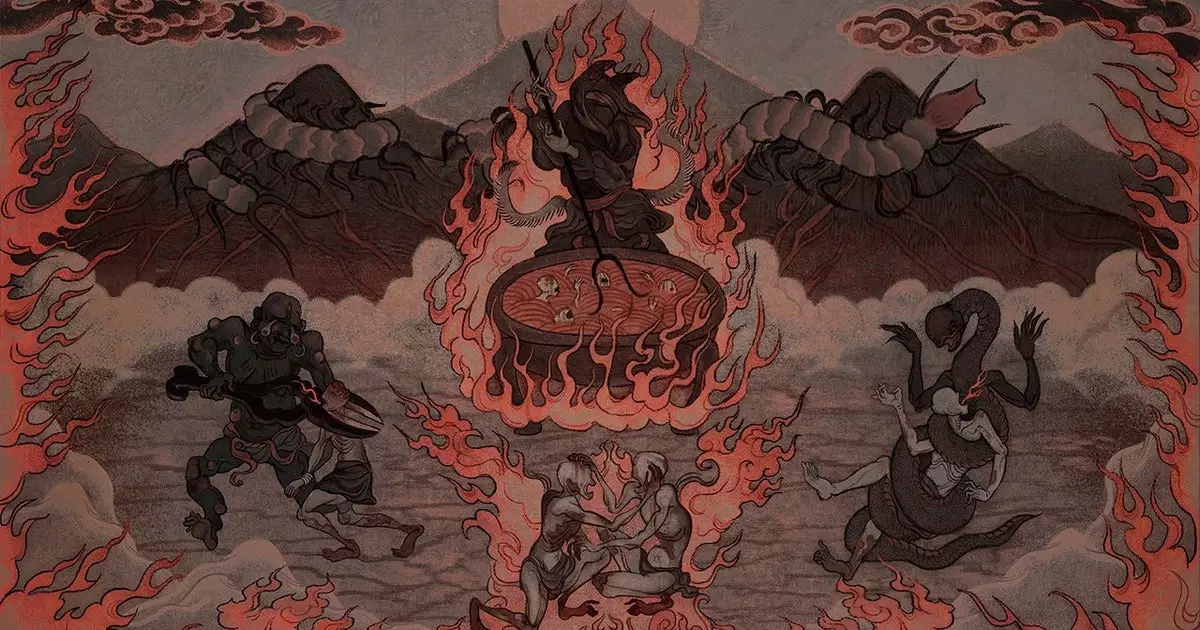In a gaming landscape teeming with polished narratives and high-fidelity graphics, *Labyrinth Of The Demon King* emerges as a masterclass in discomfort. This game is an overt homage to the unsettling atmospheres that characterized early survival horror titles. Drawing parallels from the infamous *Silent Hill* series and *Amnesia: The Dark Descent*, it immerses players in a grotesquely enchanting world reminiscent of a nightmarish fever dream. Touted as a blend of vivid horror and vintage RPG mechanics reminiscent of From Software’s *King’s Field*, it creates a unique, albeit disturbing, experience that deserves critical exploration.
At its core, the game is set in a mythically framed feudal Japan—a time marked by shadowy figures and otherworldly threats. Here, players are thrust into the shoes of an unwitting character tasked with confronting a formidable yokai that has set their lord up for an ill-fated encounter. The backdrop of trilogies involving folklore monsters, cursed warriors, and unspeakable horrors is the canvas upon which murky quests and unsettling fragility is painted. However, instead of emphasizing heroic undertones, the game aims to strip down the player to a frail existence, armed with nothing but a broken katana and a nearly useless assortment of items—a far cry from the often glorified weapons in mainstream titles.
Atmosphere of Apprehension
One of the game’s striking features is its atmospheric design, where players are enveloped in a heavy shroud of dread. The mechanics feel painstakingly slow, mirroring the cumbersome weight of fear that permeates throughout the experience. Tasks that should feel rewarding often transform into exercises in futility, such as desperately searching for a blacksmith to mend your equipment, only to encounter a grotesque ensemble of “filthbastards”—cursed beings who seem more preoccupied with their discord than with inflicting harm upon the player.
The game is an ode to disarray. Players find themselves rummaging around dilapidated houses that echo with unsettling whispers and dissonant sounds, dragooned into a relentless cycle of running, hiding, and occasionally kicking roaches that so insidiously threaten a loss of health. It’s as if each corner of the game has been designed to intentionally provoke irritation, taking the term “challenging gameplay” to delightfully cruel new heights. Therein lies one of its superior aspects—its ability to limit the player’s options, thereby fostering an environment where dread flourishes.
Aesthetic Choices and Gameplay Mechanics
The aesthetics of *Labyrinth Of The Demon King* pivot heavily on nostalgia—a visual style reminiscent of the early days of 3D gaming, with graphics that sometimes appear unfinished, echoing the disorientation of navigating through the actual labyrinth. The camera angles feel deliberately disorienting, often trapping players in views that heighten anxiety and surprise. Players may find themselves feeling like characters in a living nightmare rather than mere players interacting with a game. The choice of dither filters, lengthy cutscenes, and soundscapes evoke a sense of eeriness that is hard to shake off, enhancing the feeling of existential dread that pulses through each level.
Tactically, the game combines stamina management with its distinctive combat system, requiring players to constantly balance aggression and caution. Kicking enemies to prevent them from retaliating while also risking that your own weapon might fall into the obscurity of failure demonstrates a design choice wrought with intent—players are caught in a cycle of stress that mirrors combat’s unpredictability in real life. Every action may diminish your power or inadvertently fuel your adversaries, leading to an experience that feels brutally ruthless yet oddly captivating.
A Grim Journey Ahead
While it may still be confined to an indie niche, *Labyrinth Of The Demon King* stands tall among the PS1-era inspired horror games peppering today’s digital storefronts. Its allure lies in its unabashed immersion in discomfort, lending it an integrity that’s starkly refreshing in a world often saturated with commercialized tropes. Players are not just participants but rather reluctant travelers through its twisted labyrinth, forced to confront fears both external and internal. The journey ahead is grim, transforming players from vibrant heroes into shadows of their former selves. This is the beauty, and indeed the terror, of *Labyrinth Of The Demon King*—an experience imbued with relentless tension and haunting allure, drawing us irrevocably into its depths.

